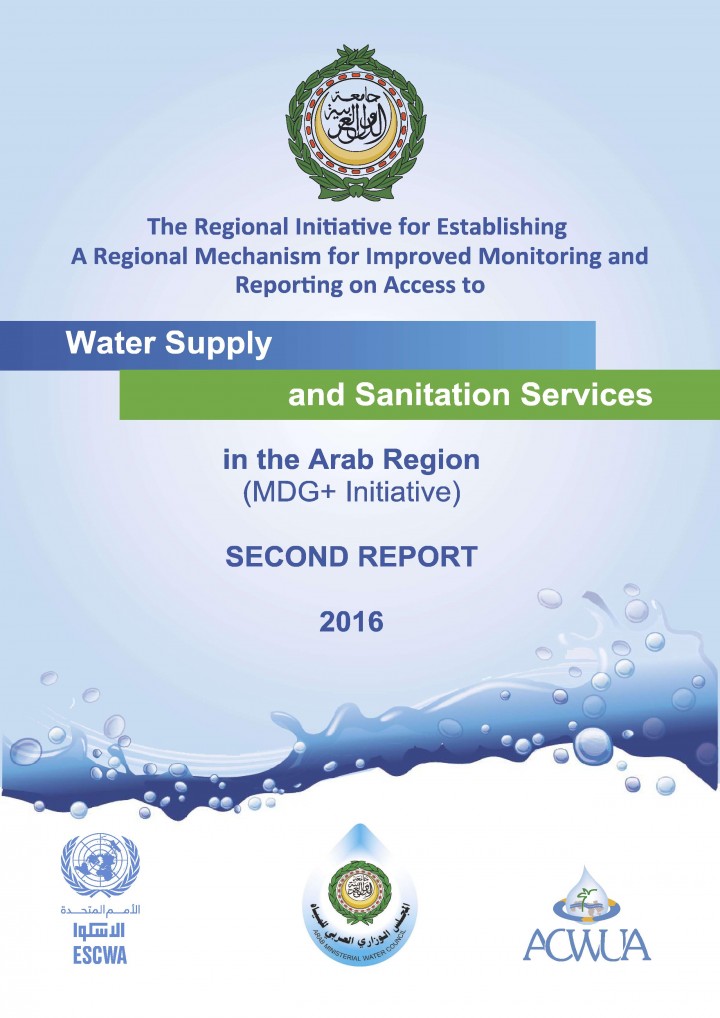Water Supply and Sanitation Services in the Arab Region - The Regional Initiative for Establishing A Regional Mechanism for Improved Monitoring and Reporting on Access to Water supply and sanitation in the Arab Region
League of Arab States, UN ESCWA, ACWUA (2016)

Published in: 2016
Pages: 170
Publisher:
The Arab Countries Water Utilities Association, Amman, Jordan
Author:
League of Arab States, UN ESCWA, ACWUA
Uploaded by:
Lara Nassar
2890 Views
103 Downloads
The establishment of the regional mechanism for monitoring and reporting on access to water supply and sanitation services in the Arab Region (MDG+ Initiative) was launched by the Arab Ministerial Water Council in 2010. The initiative provides reliable information on access to water supply services in Arab States based on a set of regionally approved indicators, a harmonized methodology and data collected and vetted by National Monitoring Teams comprised of ministries responsible for water, water and sanitation utilities and national statistical offices. The MDG+ Initiative framework includes indicators that measure water consumption, drinking water quality, accessibility, affordability, and continuity of supply, as well as sanitation-related indicators related to accessibility, affordability, wastewater treatment, wastewater type of treatment and wastewater reuse. Within the framework of a series of periodic reports that will be produced each year, the first MDG+ report was issued in 2015 which included the water supply and sanitation indicators for 11 Arab countries, and now after a year of the issuance of the first report, this second (2016) report presents the water supply and sanitation indicators for 18 Arab countries which are: Algeria, Bahrain, Egypt, Iraq, Jordan, Kuwait, Lebanon, Libya, Mauritania, Morocco, Oman, Palestine, Qatar, Saudi Arabia, Sudan, Tunis, United Arab Emirates and Yemen.
This report also includes the results of the field surveys for water supply and sanitation conducted by RAED in coordination with ESCWA and ACWUA in three countries: Jordan, Lebanon and Syria. Ten different locations in each of these countries were surveyed with a total of 3,000 surveyed households. This 2016 report includes, in addition to the results of the indicators, information about the national water and sanitation utilities that submitted data as well as the names of the focal points and national teams that have collected the data and submitted to the MDG+ unit at ACWUA.
The issuance of this report comes a year after the adoption at the United Nations Sustainable Development Summit in September 2015 of the 2030 Agenda for Sustainable Development, which includes 17 Sustainable Development Goals (SDGs) that aim to guide global action on the achievement of a common set of development objectives for the coming fifteen years. The regional experience gained through the MDG+ Initiative in data collection and reporting on the water-related indicators can inform Arab preparation and follow-up on the water and sanitation related SDGs.
The initiative provides reliable information on access to water supply services in Arab States based on a set of regionally approved indicators, a harmonized methodology and data collected and vetted by National Monitoring Teams comprised of ministries responsible for water, water and sanitation utilities and national statistical offices. The collaborative implementation of the MDG+ Initiative offers a successful example of regional water cooperation among Arab States. Arab States could thus draw upon the indicator and institutional frameworks set-up under the MDG+ Initiative to inform the development of monitoring and reporting frameworks for regional follow-up on the water-related SDGs
Bibliographic information
League of Arab States, UN ESCWA, ACWUA (2016). Water Supply and Sanitation Services in the Arab Region - The Regional Initiative for Establishing A Regional Mechanism for Improved Monitoring and Reporting on Access to Water supply and sanitation in the Arab Region. The Arab Countries Water Utilities Association, Amman, Jordan
Filter tags
Educators English Journalists Middle East & North Africa Politicians and local decision makers Practitioners















